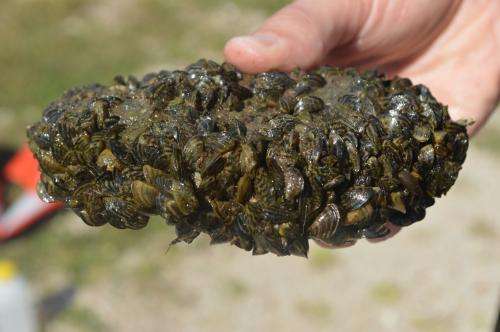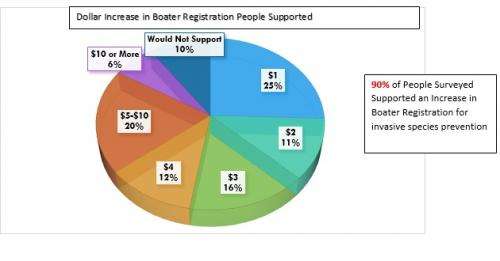Zebra mussels found at Offutt Base Lake. Credit: Mekita Rivas
An infestation of zebra mussels at Offutt Base Lake in Bellevue is causing experts to call for a statewide boat inspection program.
"We need a formal boat inspection program to keep our state from having more water bodies infested," said Allison Zach, coordinator of the Nebraska Invasive Species Program at the University of Nebraska-Lincoln.
Zebra mussels are small—about the size of a fingernail, Zach said. Native to the lakes of southern Russia, these freshwater mussels were first detected stateside in the Great Lakes in 1985.
In April 2006, Offutt Base Lake became the first water body in Nebraska with a confirmed population of zebra mussels. In 2008 and 2009, the lake was treated with copper sulfate in an effort to eradicate the population.
However, an infestation of zebra mussels found last May indicates that the treatments were unsuccessful, and water samples taken from Offutt Base Lake as recently as September show that zebra mussels are still prevalent.
"Over the summer, Nebraska Invasive Species Program technicians asked boaters at high-risk water bodies if they would support an increase in boater registration fees to support aquatic invasive species prevention and management in Nebraska," Zach said.
Of the 1,820 individuals surveyed, 90 percent supported a boat registration fee increase to fund such a program.
The only way to prevent zebra mussels from spreading, Zach said, is to employ the "Clean, Drain and Dry" protocol for all boats, trailers and equipment between uses by following these steps:
- Inspect the boat, trailer and all equipment and remove any visible vegetation or organisms
- Pull boat plugs and drain live wells prior to leaving the water body
- Flush engine with water
- Dry boat and equipment for 5 days before launching into another water body
Responses by boaters at high-risk water bodies asked if they would support an increase in boater registration fees to support invasive species prevention and management in Nebraska. Credit: Nebraska Invasive Species Program
With 21 infested water bodies in Kansas and the first infestation of quagga mussels recently discovered in South Dakota, developing and funding a boat inspection program in Nebraska will be key to keeping the state's water bodies free of invasive species, Zach said.
"We are very concerned about the zebra mussel infestations in surrounding states," she said. "With interstate boat travel, it is imperative to have a boat inspection program to educate the public and instruct them on how to 'clean, drain and dry' their boats."
Provided by University of Nebraska-Lincoln
























